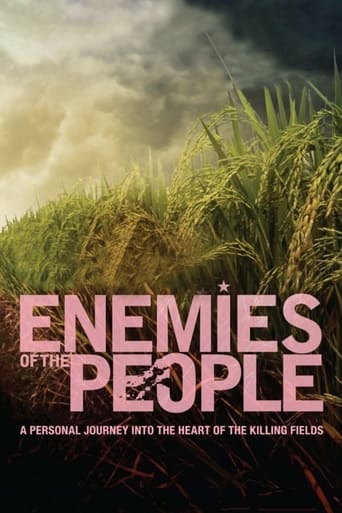

Too much of everything
... View MoreThe greatest movie ever made..!
... View MoreCharming and brutal
... View MoreThis movie feels like it was made purely to piss off people who want good shows
... View MoreCambodian newspaper reporter Thet Sambath spent his weekends for 10 years bravely and patiently finding the killers of Pol Pot's Khmer Rouge and coaxing them to tell their stories on film. He spent the same period gaining the trust of Brother No. Two, Pol Pot's right-hand man during the murderous 1975-1979 regime that left 2 million Cambodians, many of them villagers who had nothing to do with politics, dead. Sambath's painstaking interviews are shocking and chilling. He understands that low-level killers are haunted by what they were forced to do to their fellow countrymen, and he seems to understand they have a need to bear witness. It's less clear whether 82-year-old ex-leader Nuon is remorseful, even after he hears the horrible fates of Sambath's closest family members. Nuon's still-handsome face is amazingly unreadable, even as he laments the death of "patriot" Saddam Hussein. To his credit, however, Nuon never ran away. "I couldn't do that," he says. (At last, a scruple.) In addition, this movie does an amazing job of depicting the poverty of Cambodia. (Another movie I have reviewed here, "Cambodia: The Virginity Trade," points to other discouraging economic consequences of Pol Pot's terror.) At least in the rural areas where this documentary was filmed, Cambodia seems practically Stone Age with its dust-clouded dirt roads, open-air homes, and bamboo torches for lighting the night. I'm glad I saw this film -- I don't think I've ever ranked anything else on this site a 9 -- but it does leave one with a dismal view of humanity. Millions were killed because thousands were ordered to kill -- and if they didn't, they'd have been killed, too. What a sorry and primitive species we can be. And how little, if anything, we have learned from the Holocaust. At least Sambath got his harrowing stories on the record. This sad and lonely man, who now wishes only to grow healthy things in the fields -- potatoes and corn -- has produced a gift for humanity.
... View MoreOne man gives an order to "solve" the problem of political opponents, 5 train 100 to kill. 100 train a thousand to kill, and now that the political problem has been solved, the new perceived problem is the ethnically impure. at what appears to be the fourth level, the killers do their work because they fear being killed. they have no one above them to kill, no decision makers, no traitors, so they kill below...farmers, children, seamstresses...so that they will not themselves be killed.Those who loved doing the killing never take the blame. Those who hated it can't live with themselves and wonder how many "holes of hell" they must go into, and if they will ever be reincarnated as humans again.The man at the top is remorseful, a child who grieves for how his thoughtlessness hurt his country. But he won't tell that to the cops.Tremendous. Stunning documentary work.
... View MoreThis is my film of the year. I urge you to see it, especially as it isn't getting a DVD release until July 2011. You won't necessarily thank me for the recommendation, however, because it is bloody hard going. It has a terrible power, near-unparalleled among this year's offerings, and is draining rather than simply 'numbing' – possibly because of the sheer humanity involved.The film's co-director Thet Sambath is an investigative reporter from Cambodia who has obtained something rather astonishing: frank and detailed confessions from former Khmer Rouge footsoldiers, mainly uneducated farmers, who helped turn their already battered country into a charnel house between 1975-1979. Against a backdrop of genocide trials for party leaders, this patient, methodical and remarkably gracious journalist, whose own family was purged, hears how ordinary men and women sowed the Killing Fields with the bones of their countrymen and littered the rivers with dead children. Some are filled with shame, although others believe Buddhism will save them."The flesh made a boiling sound as it decomposed" one recalls matter-of-factly. Elsewhere, an old man giggles as he mock-manhandles a young friend, miming with a plastic knife how he'd slit each throat. Everything is at once hidden and in plain sight: executions were carried out at dusk by torchlight, while the semantics of genocide are familiarly abstract – "problems" were "solved", but nobody seems to know where the orders came from. Cannibalism was rife. The effect is akin to chatting with psychopathic inmates in the beautiful grounds of some high-security psychiatric hospital.When brutal regimes such as this one are over, they become fodder for academic papers or retrospective documentaries. Sambath states that what he is doing is "not for journalism... (but) for history", providing an explicit archive for a new generation of Cambodians who, until last year, were not required to be educated about this chapter from their recent past. The result is shocking, humbling, and utterly unforgettable.
... View Moreexcerpt, more at my location - Filmmakers have long been obsessed by the Vietnam conflict. From Kubrick to Coppola and all stops in between, the war has been a cinema staple for years. Somehow, the Khmer Rouge regime in Cambodia has failed to ignite Western interest to anywhere near the same extent. Remaining in the shadow of its neighbour, a genocide which saw the massacre of up to two million people in the aftermath of the Vietnam War has rarely been represented on screen.Enemies Of The People is a deeply personal film which, despite its harrowing content, offers a real sense of redemption to those who are both victims and perpetrators of the Khmer Rouge. More than just a labour of love for Thet Sambath, it offers a sense of closure and reconciliation - and serves as a powerful and unique historical document.
... View More